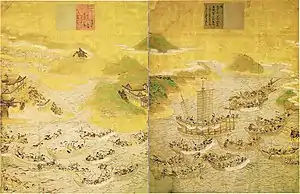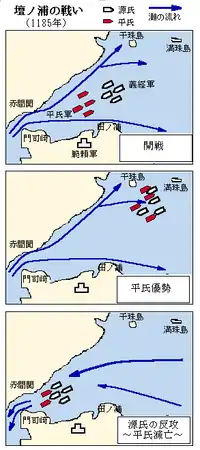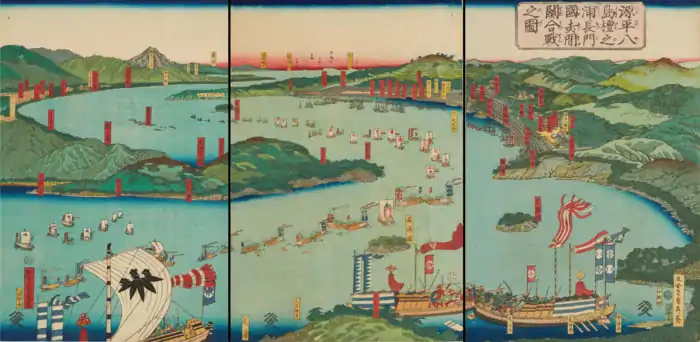Battle of Dan-no-ura
The Battle of Dan-no-ura (壇ノ浦の戦い, Dan-no-ura no tatakai) was a major sea battle of the Genpei War, occurring at Dan-no-ura, in the Shimonoseki Strait off the southern tip of Honshū. On April 25, 1185 (or March 24, 1185 by the official page of Shimonoseki City), the fleet of the Minamoto clan (Genji), led by Minamoto no Yoshitsune, defeated the fleet of the Taira clan (Heike). The morning rip tide was an advantage to the Taira in the morning but turned to their disadvantage in the afternoon. The young Emperor Antoku was one of those who perished amongst the Taira nobles.[1]
| Battle of Dan-no-ura | |||||||||
|---|---|---|---|---|---|---|---|---|---|
| Part of the Genpei War | |||||||||
 | |||||||||
| |||||||||
| Belligerents | |||||||||
|
|
| ||||||||
| Commanders and leaders | |||||||||
| Minamoto no Yoshitsune |
Taira no Munemori Taira no Tomomori† | ||||||||
| Strength | |||||||||
| 300 ships[1] | 400–500 ships[1] | ||||||||
History

The Taira were outnumbered, but some sources say that they had the advantage over the Minamoto in understanding the tides of that particular area, as well as naval combat tactics in general. The Taira split their fleet into three squadrons, while their enemy arrived en masse, their ships abreast, and archers ready.[2] The beginning of the battle consisted mainly of a long-range archery exchange, before the Taira took the initiative, using the tides to help them try to surround the enemy ships. They engaged the Minamoto, and the archery from a distance eventually gave way to hand-to-hand combat with swords and daggers after the crews of the ships boarded each other. However, the tide changed, and the advantage was given back to the Minamoto.[3] One of the crucial factors that allowed the Minamoto to win the battle was that a Taira general, Taguchi Shigeyoshi, defected and attacked the Taira from the rear.[4] He also revealed to the Minamoto which ship the six-year-old Emperor Antoku was on. Their archers turned their attention to the helmsmen and rowers of the Emperor's ship, as well as the rest of their enemy's fleet, sending their ships out of control. Many of the Taira saw the battle turn against them and committed suicide.[3]
Among those who perished this way were Antoku and his grandmother, Nun of the Second Rank, Taira no Tokiko the widow of Taira no Kiyomori.[4]:122,142–143
To this day, the heike crabs found in the Straits of Shimonoseki are considered by the Japanese to hold the spirits of the Taira warriors. The Taira attempted to toss the imperial regalia off the ship but only managed to get the sword and jewel into the water before the ship holding the regalia was captured.[5]
The jewel was recovered by divers; many presume the sword to have been lost at this time, though it is officially said to have been recovered and enshrined at Atsuta Shrine.
This decisive defeat of the Taira forces led to the end of the Taira bid for control of Japan. Minamoto no Yoritomo, the elder half-brother of Minamoto Yoshitsune, became the first shōgun, establishing his military government (bakufu) in Kamakura. In this battle the Taira lost Taira Tomomori, Taira Noritsune, Taira Norimori, Taira Tsunemori, Taira Sukemori, Taira Arimori and Taira Yukimori, who were killed.
In culture
The battle is the subject of an opera by the Thai-American composer S. P. Somtow. Called Dan no Ura, the opera premiered in Bangkok in 2014.
See also
References
- Sansom, George (1958). A History of Japan to 1334. Stanford University Press. pp. 302–303. ISBN 0804705232.
- Turnbull, Stephen (2003). Fighting Ships of the Far East (2): Japan and Korea AD 612-1639 (1st ed.). Osprey Publishing. pp. 41–42. ISBN 9781841764788.
- Turnbull, Stephen (1998). The Samurai Sourcebook. Cassell & Co. pp. 204–205. ISBN 1854095234.
- The Tales of the Heike. Translated by Burton Watson. Columbia University Press. 2006. pp. 136–140. ISBN 9780231138031.
- Turnbull, Stephen (1977). The Samurai, A Military History. MacMillan Publishing Co., Inc. pp. 77–81. ISBN 0026205408.
- Stephen Turnbull: Samurai: The World of the Warrior. Osprey Publishing, 2006, pp. 34–38 (online copy, p. 34, at Google Books)
- Excerpt from the City of Shimonoseki homepage http://www.city.shimonoseki.yamaguchi.jp/seisaku/kokusai/y_english/history/ cites the Battle of Dan No Ura as occurring on March 24, 1185
- Gaskin, Carol, and Vince Hawkins (1990). The Ways of the Samurai. New York: Barnes & Noble Books.
Further reading
- Stephen Turnbull: Fighting Ships of the Far East (2): Japan and Korea AD 612–1639. Osprey Publishing 2012, pp. 41–42 (online copy, p. 41, at Google Books)
External links
| Wikimedia Commons has media related to Battle of Dan-no-ura. |

